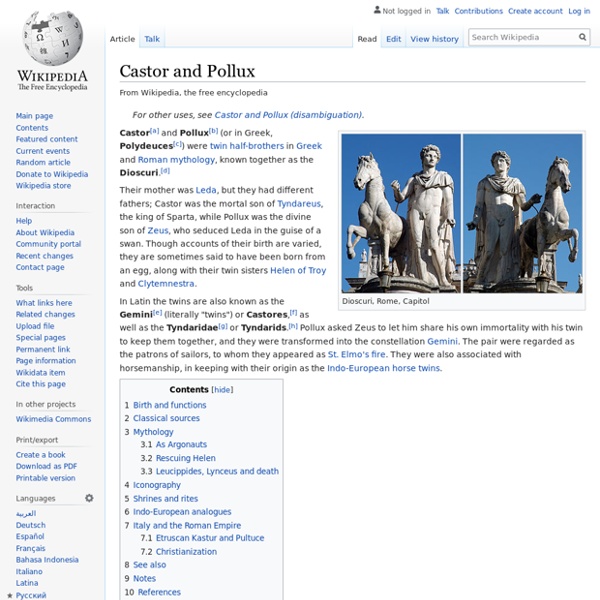Calydon
Greek city in ancient Aetolia The Laphrion sanctuary plateau of Calydon with Varasova mountain on the background. Calydon or Kalydon (; Ancient Greek: Καλυδών) was a Greek city in ancient Aetolia, situated on the west bank of the river Evenus, 7.5 Roman miles (approx. 11 km) from the sea.[1] Its name is most famous today for the Calydonian Boar that had to be overcome by heroes of the Olympian age. Mythology[edit] The heroes of Calydon are among the most celebrated of the heroic age. It was the residence of Oeneus, father of Tydeus and Meleager, and grandfather of Diomedes.
Jason
We ask you, humbly: don't scroll away. Hi, reader in Canada, it seems you use Wikipedia a lot; that's great! This is the 6th appeal we've shown you.
Aetolia
Region of Ancient Greece Aetolia (Greek: Αἰτωλία, romanized: Aἰtōlía) is a mountainous region of Greece on the north coast of the Gulf of Corinth, forming the eastern part of the modern regional unit of Aetolia-Acarnania. Geography[edit] The Achelous River separates Aetolia from Acarnania to the west; on the north it had boundaries with Epirus and Thessaly; on the east with the Ozolian Locrians; and on the south the entrance to the Corinthian Gulf defined the limits of Aetolia. In classical times Aetolia comprised two parts: "Old Aetolia" (Greek: Παλιά Αιτωλία, romanized: Paliá Aitolía) in the west, from the Achelous to the Evenus and Calydon; and "New Aetolia" (Greek: Νέα Αιτωλία, romanized: Néa Aitolía) or "Acquired Aetolia" (Greek: Αἰτωλία Ἐπίκτητος, romanized: Aitolía Epíktitos) in the east, from the Evenus and Calydon to the Ozolian Locrians. The country has a level and fruitful coastal region, but an unproductive and mountainous interior.
Byzantine Empire
Roman Empire during Late Antiquity and the Middle Ages The Byzantine Empire, also referred to as the Eastern Roman Empire or Byzantium, was the continuation of the Roman Empire in its eastern provinces during Late Antiquity and the Middle Ages, when its capital city was Constantinople. It survived the fragmentation and fall of the Western Roman Empire in the 5th century and continued to exist for an additional thousand years until it fell to the Ottoman Empire in 1453. During most of its existence, the empire was the most powerful economic, cultural, and military force in Europe. "Byzantine Empire" is a term created after the end of the realm; its citizens continued to refer to their empire simply as the Roman Empire (Medieval Greek: Βασιλεία Ῥωμαίων, romanized: Basileía Rhōmaíōn) or Romania (Medieval Greek: Ῥωμανία), and to themselves as Romans (Medieval Greek: Ῥωμαῖοι, romanized: Rhōmaîoi) – a term which Greeks continued to use for themselves into Ottoman times. Nomenclature[edit]
Laocoön
Trojan priest in Greek and Roman mythology Laocoön (;[1][2][Note 1] Ancient Greek: Λαοκόων, IPA: [laokóɔːn]), the son of Acoetes, is a figure in Greek and Roman mythology and the Epic Cycle.[3] He was a Trojan priest who was attacked, with his two sons, by giant serpents sent by the gods. The story of Laocoön has been the subject of numerous artists, both in ancient and in more contemporary times. Death[edit] The most detailed description of Laocoön's grisly fate was provided by Quintus Smyrnaeus in Posthomerica, a later, literary version of events following the Iliad. According to Quintus, Laocoön begged the Trojans to set fire to the horse to ensure it was not a trick.
Christopher of Mytilene
Christophoros of Mytilene (Greek: Χριστόφορος Μυτιληναῖος, Christophoros Mytilenaios; ca. 1000 – after 1050) was a Greek-language poet living in the first half of the 11th century. His works include poems on various subjects and four Christian calendars. Biography[edit] Events described in his poems suggest that he started writing in the reign of Romanos III (1028–1034), but most poems can be dated to the reign of Constantine IX (1042–1055), an emperor who favoured culture and literature. Works[edit] Various Verses (στίχοι διάφοροι) is the title of his collection of 145 poems, which covers a wide range of genres and topics.
Oeneus
Oeneus was a king of the area of Calydon in Greek mythology, son of King Porthaon and Queen Euryte. He married Althaea, with whom he had a number of children, including Deianeira, Meleager, Toxeus, Clymenus, Periphas, Gorge, Eurymede, Perimede and Melanippe. When Artemis sent a huge boar, called the Calydonian Boar, in his lands to ravage them because he had forgotten to honour the goddess, Oeneus asked his son Meleager to gather a party of heroes to kill the creature.
Abraham Cowley
17th-century English writer Abraham Cowley (;[1] 1618 – 28 July 1667) was an English poet born in the City of London late in 1618. He was one of the leading English poets of the 17th century, with 14 printings of his Works published between 1668 and 1721.[2]
Oeneus
This article uses HTML markup. Please help by changing HTML markup to Wiki markup where appropriate. For help finding or replacing the problematic tags, see instructions. (February 2019)



